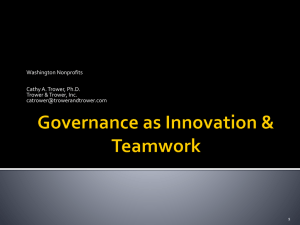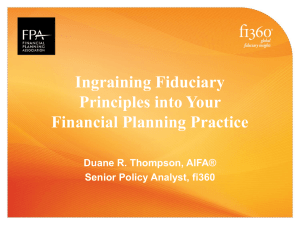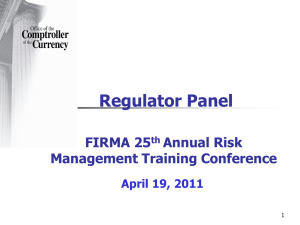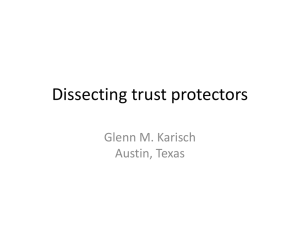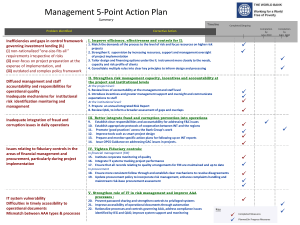This Employer Webinar Series program is presented by Spencer
advertisement
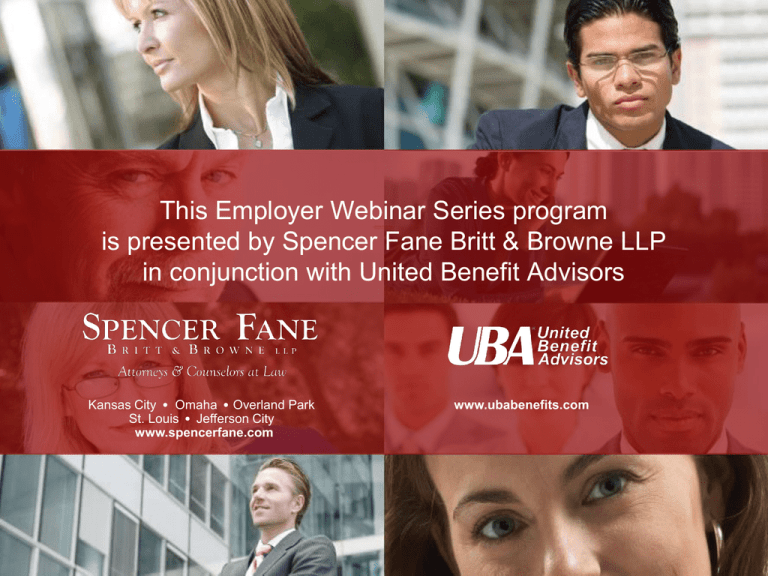
This Employer Webinar Series program is presented by Spencer Fane Britt & Browne LLP in conjunction with United Benefit Advisors This Employer Webinar Series program is presented by Spencer Fane Britt & Browne LLP in conjunction with United Benefit Advisors Kansas City = Omaha = Overland Park St. Louis = Jefferson City www.spencerfane.com www.ubabenefits.com Managing Fiduciary Risk Under ERISA: Copyright 2011 A Primer for Employers, HR Directors, and Plan Administrators 2 Presenters Gregory L. Ash, JD Partner gash@spencerfane.com 913.327.5115 Julia M. Vander Weele, JD Partner jvanderweele@spencerfane.com 816.292.8182 Copyright 2011 3 The ERISA Standard “[T]he standard of care owed by ERISA fiduciaries . . . has been described as ‘the highest known to law.’” Herman v. NationsBank Trust Co., 126 F.3d 1354 (11th Cir. 1997) Copyright 2011 4 Agenda Copyright 2011 Overview of Fiduciary Rules Who is a Fiduciary Fiduciary Duties Prohibited Transactions Strategies for Managing Fiduciary Risk Examples 5 In Context . . . 401(k) Plan Selection of Investment Consultant ABC Company sponsors the ABC Company 401(k) Plan, a defined contribution arrangement The Plan authorizes the Administrative Committee to be the “named fiduciary” and Plan administrator under ERISA Copyright 2011 The Committee is appointed by the Company’s CEO; members of the Company’s HR department assist the Committee with day-to-day Plan administration The Committee has decided to appoint an investment consultant to create and manage model portfolios in which participants may invest What fiduciary issues are implicated by this action? 6 In Context . . . Insured Health Plan Denied Claim for Benefits Acme Consolidated sponsors a fully-insured health plan The plan provides health benefits through an insurance policy issued by Global Insurance Company Global decides claims and appeals Copyright 2011 John Doe, an Acme employee, complains to Acme’s HR Director that Global denied his claim for chiropractic benefits Acme’s HR Director calls her contact at Global and directs Global to pay the claim Who are the fiduciaries in this scenario? 7 ERISA’s Fiduciary Duties Who are fiduciaries under ERISA? A person is a fiduciary to the extent he or she: Exercises any discretionary authority or control concerning the management of a plan Exercises any authority or control over the management or disposition of a plan’s assets Renders investment advice for a fee or other compensation, directly or indirectly, with respect to any monies or property of a plan Has any discretionary responsibility in the administration of the plan Copyright 2011 Is a “named fiduciary” under the plan 8 Examples of Fiduciaries Copyright 2011 Boards of Trustees Administrative Commitees Plan Administrators Plan Trustees (e.g., bank trustees, custodians) Investment Managers/Consultants Named Fiduciaries 9 Other Common Fiduciaries Fully-Insured Health Plan Self-Funded Health Plan Third-Party Administrator (depending on role) Employer (as plan administrator) Administrative/Claims Committee Investment Consultant Trustee/Custodian 401(k) Plan Copyright 2011 Employer (as plan administrator) Insurer (as claims payor) Administrative Committee Investment Committee Investment Consultant Trustee/Custodian Employer (as plan administrator) 10 Ministerial Function Exception “Ministerial functions” include: Applying eligibility rules Calculating service and compensation credits Preparing employee educational material Maintaining service and employment records Preparing reports required by the government Copyright 2011 11 Ministerial Functions (cont’d) Copyright 2011 Calculating benefits Orienting and educating new participants Collecting and applying contributions Preparing participant benefit reports Processing claims Making recommendations to decision makers 12 In Context . . . 401(k) Plan Copyright 2011 Retention of Investment Consultant Selection is a fiduciary act Discretionary decision Implicates management of plan assets Fiduciaries “on the hook” include: Committee members making the decision The appointed investment consultant HR staff? Do we make staff fiduciaries by giving them signature authority? 13 In Context . . . Insured Health Plan Denied Claim for Benefits Copyright 2011 Claim denial by Global (insurer) is a fiduciary act Discretionary decision Insurers typically are the only claims fiduciary Does HR Director’s involvement create fiduciary status? It depends: does Global pay the claim as a result? Her involvement creates appearance of discretionary authority, and potential fiduciary status 14 Fiduciary Duties Copyright 2011 Fiduciaries must discharge their duties solely in the interests of participants and beneficiaries, and … 15 Fiduciary Duties Copyright 2011 Exclusive Benefit Rule ... for the exclusive purpose of: Providing benefits, or Defraying reasonable expenses of plan administration 16 Fiduciary Duties Prudent Expert Rule ... fiduciaries must discharge their duties: Copyright 2011 With the care, skill, prudence, and diligence under the circumstances then prevailing that a prudent person acting in a like capacity and familiar with such matters would use in the conduct of an enterprise of a like character and with like aims 17 Fiduciary Duties Diversification of Assets ... fiduciaries must discharge their duties: Copyright 2011 By diversifying the investments of the plan so as to minimize the risk of large losses 18 Fiduciary Duties Comply with Plan Documents ... fiduciaries must discharge their duties: Copyright 2011 In accordance with the documents and instruments governing the plan 19 Fiduciary Duties Copyright 2011 Duty to Inform ... fiduciaries have an obligation to: Provide required information about plan Distribute accurate and complete information Disclose potential plan changes when under “serious consideration” 20 Fiduciary Duties Copyright 2011 A change is under “serious consideration” when: There is a specific proposal Being discussed for purposes of implementation By senior management with the authority to implement the change 21 In Context . . . 401(k) Plan Copyright 2011 Retention of Investment Consultant Exclusive benefit issues Consider consultant’s qualifications, rather than outside relationships Prudence issues implicated by selection Prudent expert standard – Committee must become educated RFP process Check references, investigate background Negotiate acceptable contract Careful documentation of process 22 In Context . . . Insured Health Plan Denied Claim for Benefits Plan document rule Are the chiropractic services actually covered services under the plan’s terms? Duty to inform Did the plan and SPD accurately describe the covered and excluded services? Copyright 2011 Did the HR Director tell Mr. Doe the chiropractic services would be covered, when in fact they were not? 23 Fiduciary Liability Copyright 2011 Personal liability Liable for restitution, disgorgement, and other equitable relief Liable “to the extent” person is a fiduciary Co-fiduciary liability Knowingly participate in breach Enable others to breach Fail to remedy known breach 24 In Context . . . 401(k) Plan Retention of Investment Consultant Selection is effort to delegate fiduciary responsibility for plan investments Investment consultant assumes liability for making individual investment decisions Copyright 2011 25 Prohibited Transactions ERISA Section 406(a) A fiduciary may not engage in any transaction with respect to the plan if he or she knows or should know that such transaction constitutes a direct or indirect: Copyright 2011 Sale or exchange, or leasing, of any property between the plan and a party in interest Lending of money or extension of credit between the plan and a party in interest 26 Prohibited Transactions (cont’d) ERISA Section 406(a), continued . . . Copyright 2011 Furnishing of goods, services, or facilities between a plan and a party in interest Transfer to, or use by or for the benefit of a party in interest, of any plan assets Acquisition, on behalf of the plan, of any employer security or employer real property in violation of ERISA § 407(a) 27 Prohibited Transactions (cont’d) ERISA Section 406(b) A fiduciary with respect to a plan shall not: Copyright 2011 Deal with the assets of the plan in his own interest or for his own account Act in any transaction involving the plan on behalf of a party whose interests are adverse to those of the plan or its participants Receive any consideration for his or her own personal account from any party dealing with the plan in connection with a transaction involving plan assets 28 Prohibited Transactions (cont’d) Copyright 2011 Parties in interest include: Any fiduciary, counsel, or employee of the plan A person providing services to the plan An employer, any of whose employees are covered by the plan An employee organization (i.e., union), any of whose members are covered by the plan 29 Prohibited Transactions (cont’d) Copyright 2011 Parties in interest . . . An owner of 50% or more of an employer or employee organization described above Certain family members of any individual described above An employee, officer, director (or person with similar powers), or a 10% or more shareholder, of entities described above 30 Prohibited Transactions (cont’d) Exemptions from prohibited transaction rules Administrative exemptions Statutory exemptions Copyright 2011 e.g., reasonable arrangements with parties in interest for office space or services necessary for the establishment or operation of the plan, if no more than reasonable compensation is paid 31 In Context . . . 401(k) Plan Retention of Investment Consultant Copyright 2011 Section 406(a) issues: Transferring plan assets to party in interest (consultant is a fiduciary and service provider) Exemption if compensation is reasonable Section 406(b) issues: Does appointing fiduciary have a pre-existing relationship with investment consultant? Any indication of self-dealing? 32 Prohibited Transaction Penalties “First tier” excise tax equal to 15% of amount involved for the taxable period Copyright 2011 Assessed against any disqualified person who participates in the transaction “Second tier” excise tax equal to 100% of amount involved if the transaction is not corrected ERISA § 502(l) penalty 33 Managing Fiduciary Risk Copyright 2011 Pay Attention to Plan Governance Review Fiduciary Liability Insurance Monitor Plan Fees Delegate Fiduciary Functions 34 Plan Governance Periodic fiduciary education/updates Make sure fiduciaries understand the “hat” they wear, and when Hold regular meetings Copyright 2011 At least twice per year Circulate a written agenda in advance Review investment funds and plan operation Prepare detailed meeting minutes Understand the employer’s role 35 Review Fiduciary Liability Insurance Copyright 2011 Are all “fiduciaries” covered? When was the list of insureds last updated? Carefully review exclusions Negotiate for better terms Report potential claims immediately 36 Monitor Plan Fees Copyright 2011 Recent litigation challenges “excessive” 401(k) fees Allegedly undisclosed to participants Hard dollar payments and “revenue sharing” challenged Plaintiffs allege that fiduciaries did not pay attention Review plan’s fee structure 37 Delegating Fiduciary Duties Copyright 2011 Our Example . . . appointment of investment advisor Selection is effort to delegate fiduciary responsibility for plan investments Investment advisor assumes (or shares) liability for making individual investment decisions How are functions delegated? Fiduciary duties may be allocated among named fiduciaries, but . . . Plan must expressly authorize delegation Named fiduciaries may also delegate non-trustee fiduciary duties to others 38 Delegating Fiduciary Duties (cont’d) Copyright 2011 Effect of delegation Named fiduciary’s liability is limited upon proper delegation The delegation itself is a fiduciary act Delegating fiduciary must monitor the party to whom duties are delegated Delegating 401(k) investment responsibilities Co-fiduciary relationship, or “Investment manager” under ERISA § 3(38) 39 More Examples Fiduciary Status The Company’s CEO has the authority to appoint members of a 401(k) plan’s administrative committee. Is he or she an ERISA fiduciary? Yes, to the extent the CEO exercises that authority. The CEO is not a fiduciary with respect to actions subsequently taken by the committee, except: Copyright 2011 Ongoing duty to monitor Co-fiduciary liability 40 More Examples Copyright 2011 Co-Fiduciary Liability The trustees of a self-funded health plan appoint a TPA. They consider only one candidate and do not investigate its references. The TPA is given check writing authority on the plan’s account. The TPA then engages in a prohibited transaction by using plan assets to pay its own creditors. Are the trustees liable? 41 More Examples Co-Fiduciary Liability (cont’d) Perhaps, as co-fiduciaries of the TPA. “Failure to remedy” prong Copyright 2011 “Enabling” prong Appointing an unqualified TPA Failing to monitor the TPA If trustees become aware of the prohibited transaction, but do nothing to remedy it 42 More Examples Dual Roles Individuals can wear two “hats”; fiduciary and settlor The line is not always clear; individuals may have responsibilities on both fronts Wearing their settlor hat, individuals may: Copyright 2011 Adopt or terminate a plan Amend the plan Set or change employee contribution levels The fiduciary hat is required when: Administering the plan (communications, plan interpretations, claims and appeals) Managing plan assets (reviewing investment performance, selecting investment managers, choosing investment funds) 43 More Examples Health Plan Fiduciary Issues Copyright 2011 The trustees of a self-funded health plan decide how and where to invest the plan’s assets Fiduciary act The trustees amend the plan to increase deductibles from $250 to $500 Typically not a fiduciary act (settlor function) HR staff advises an employee about coverage of a service under an insured dental plan Ordinarily, the insurer decides claims and interprets its policy, and thus is the fiduciary HR staff may inadvertently become a fiduciary by offering a policy interpretation 44 The Bottom Line Be aware of your role(s) Educate yourself Ask questions Copyright 2011 45 Prudent, Not Perfect The key is a prudent process “[ERISA’s] test of prudence ... is one of conduct, and not a test of the result of performance of the investment. The focus of the inquiry is how the fiduciary acted in his selection of the investment, and not whether his investments succeeded or failed.” Donovan v. Cunningham, 716 F.2d 1455, 1467 (5th Cir. 1983) Copyright 2011 46 Thank you for your participation in the Employer Webinar Series. To obtain a recording of this presentation, or to register for future presentations, contact your local UBA Member Firm. This Employer Webinar Series program is presented by Spencer Fane Britt & Browne LLP in conjunction with United Benefit Advisors Kansas City = Omaha = Overland Park St. Louis = Jefferson City www.spencerfane.com www.UBAbenefits.com
![Mark Whitenack Digital Assets PowerPoint Presentation []](http://s2.studylib.net/store/data/005383425_1-9cf830a5f2e9fc777daa963eb9460c8e-300x300.png)


